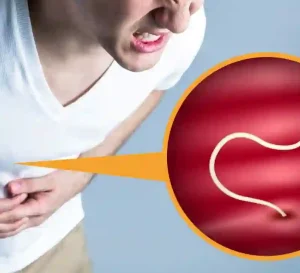This article is reviewed by an expert

Intestinal worms, also known as stomach worms, are parasitic organisms that can infect the gastrointestinal tract of humans. These tiny organisms can cause a wide range of symptoms and health issues, affecting individuals of all ages. Understanding the symptoms, causes, diagnosis, and treatment options for intestinal worms is crucial for prompt identification and effective management of this condition. In this comprehensive article, we will delve into the world of intestinal worms, exploring their impact on human health and shedding light on various aspects of this parasitic infection.
Intestinal worms can affect different parts of the digestive tract (system), including the stomach, small intestine, and large intestine. They can range in size, from microscopic organisms to larger worms that are visible to the naked eye. These parasites can enter the body through various routes, such as contaminated food and water, poor hygiene practices, or close contact with infected individuals.
Types of worms and how they enter the body
Various types of intestinal worms can affect people. Below, we look at some of them.
Tapeworm
A tapeworm is a type of flatworm that lives in the intestine, where it attaches itself to the intestinal wall.
There are several types, which are of the following:
- Taenia solium (T. solium) comes from raw or undercooked pork. It is more common in Latin America, Eastern Europe, sub-Saharan Africa, India, and Asia.
- T. asiatica comes from beef or pig liver.
- T. saginata comes from beef or pig liver and occurs mainly in places where people eat raw beef.
According to the World Health Organization (WHO) only T. solium has a significant impact on health. Without treatment, T. solium larvae can cause cysts in the skin, eyes, muscles, and CNS. In the brain, they can lead to:
- a severe headache
- vision loss
- seizures
- death
Experts believe that in areas where it occurs, it is responsible for up to 70% of epilepsy cases.
Tapeworm eggs can also be present in water and may enter the body if a person consumes contaminated water.
Hookworm
Hookworms live in the small intestine. Their name refers to how one end of the body tapers off into a needle or hook shape.
Two types — N. americanus and A. duodenale — only occur in humans.
Hookworms enter the body through the skin — for instance, if a person walks barefoot on contaminated soil. Once inside, they lay eggs in the small intestine.
One kind can also enter the body if a person consumes the larvae, for instance, on food or the hands.
Most people with hookworm have no symptoms. Some individuals may have gastrointestinal symptoms, especially with a first-time infection. More serious complications include protein loss and anemia due to blood loss.
Fluke
Flukes are a type of flatworm. They can affect the lungs, intestines, liver, and other parts of the body. Liver flukes affect the liver, gallbladder, and bile duct.
Two types, Clonorchis and Opisthorchis, can enter the body when a person eats contaminated raw or undercooked:
- fish
- crabs
- crawfish
Most people will not have symptoms, but an infection that lasts a long time can lead to severe symptoms and complications. Without treatment, infection can last for up to 25–30 years which is the life span of these parasites.
If a person with Opisthorchis has symptoms, they may experience:
- indigestion
- abdominal pain
- diarrhea or constipation
- nausea
Another type, Fasciola, can occur anywhere there are sheep or cattle. The larvae can enter the body if a person eats contaminated watercress or other water plants.
Pinworm: A pinworm is a small, thin roundworm around the length of a staple.
Pinworms are relatively harmless and can live in the colon and rectum of humans. A person can pass the worms on to someone else through direct contact or by sharing a contaminated object with them, such as food, clothing, or bedding.
Pinworms commonly cause itching around the anus, which can affect sleep. When a person is asleep, female pinworms leave the anus to lay their eggs on the surrounding skin.
Many people with pinworm experience no symptoms or mild symptoms.
Regular hand-washing and daily bathing can help prevent the spread.
Ascaris
Ascaris is one of the most common parasites, affecting up to 1.2 billion people globally. It causes the disease ascariasis.
Ascaris is similar to a hookworm but only a few inches (in) long. It lives in contaminated soil. It can enter the body when people ingest the eggs on fruits or vegetables that have not been carefully washed, peeled, or cooked.
Inside the body, it lives in the intestine. A person with Ascaris can pass on the eggs in faeces.
Individuals with an ascariasis infection may have:
- no symptoms
- mild abdominal pain or discomfort
- intestinal blockage, in severe cases
It can also affect growth in children.
Trichinella
Trichinella is a type of roundworm. A person can ingest them by eating undercooked or raw meats from animals that eat meat, such as pigs or wild boar. Contaminated meat contains live larvae. The larvae then grow in the intestines.
On reaching their full size, the Trichinella worms may leave the intestines and live in other tissues, such as the muscles.
Abdominal symptoms can appear 1–2 days after eating contaminated meat, and other symptoms can appear 2–8 weeks later.
Symptoms include:
- nausea and vomiting
- diarrhea
- abdominal pain
- chills and fever
- headache
- cough
- muscle aches
- joint pain
- swelling of the face or eyes
- itching
- constipation
- difficulty breathing
- heart problems
Severe cases can be fatal.
Prescription drugs can treat Trichinella infection. A person should seek medical help as soon as possible if they notice symptoms.
Diagnosis of Intestinal Worms
If you suspect you have intestinal worms, it is important to seek medical evaluation for an accurate diagnosis. Healthcare professionals may use the following methods to diagnose stomach worms [2]:
- Stool sample analysis
Examination of a stool sample can help identify the presence of worm eggs or larvae. A colonoscopy if stool tests do not show the cause of symptoms
- Blood tests
Blood tests may be conducted to check for specific antibodies or markers indicating the presence of certain types of worms.
- Imaging tests
In some cases, imaging tests such as ultrasound or endoscopy may be used to visualize the gastrointestinal tract and identify any worms or related complications.
Treatment of Intestinal Worms

The treatment for intestinal worms typically involves medication to kill and eliminate the parasites. The specific type of medication and duration of treatment may vary depending on the type of worm and the severity of the infection. Common medications for treating stomach worms include:
- Anthelminthic drugs
These medications are specifically designed to target and eliminate intestinal worms. They are available in various forms such as tablets, capsules, or suspensions [3].
- Combination therapy
In certain cases, a combination of different medications synthetic & herbal drugs may be prescribed to effectively treat multiple types of worms [1].
- Follow-up testing
After completing the prescribed treatment, follow-up testing may be recommended to ensure the elimination of the worms and to monitor for any recurrence [1].
Home Remedies for Intestinal Worms
In addition to medical treatment, certain home remedies may help support the treatment of intestinal worms. It is important to note that these remedies should not replace medical treatment but can be used as supportive measures. Some common home remedies include [4]:
- Hygiene practices
Practising good hygiene, such as frequent hand washing, keeping nails trimmed, and maintaining a clean living environment, can help prevent the spread of worms.
- Dietary modifications
Consuming a nutritious diet rich in fruits, vegetables, and fibre can support overall gut health and promote the elimination of worms.
- Herbal remedies
Some herbs and spices, such as garlic, and papaya seeds, are believed to have antiparasitic properties and may be incorporated into the diet or taken as supplements.
Complications
Intestinal worms can sometimes lead to complications. How these affect the body will depend on the worm, but possible complications include:
- Anemia and other nutritional deficiencies, due to difficulty absorbing nutrients
- Intestinal blockage
- Problems with lung and heart function
- Human cysticercosis, which can result in vision loss and seizures
In some cases, the complications stemming from untreated parasites can be life threatening.
Conclusion
Intestinal worms, or stomach worms, can cause various symptoms and health issues. It is essential to recognize the signs of infection and seek proper medical evaluation and treatment. Prompt diagnosis and appropriate treatment with anthelmintic drugs can effectively eliminate the worms and alleviate symptoms. Additionally, practising good hygiene, maintaining a healthy diet, and considering supportive home remedies can aid in the treatment process. Remember, it is important to consult a healthcare professional for an accurate diagnosis and personalized treatment plan.
Disclaimer: The information provided here is for general information and not meant to substitute any medical advice. Please consult your doctor for appropriate medical consultation.
References:
- https://www.healthline.com/health/intestinal-worms
- https://www.mayoclinic.org/diseases-conditions/ascariasis/diagnosis-treatment/drc-20369597#:~:text=If%20you’re%20infested%20with,in%20the%20pancreas%20or%20liver.
- https://pubmed.ncbi.nlm.nih.gov/12321815/
- https://www.medicalnewstoday.com/articles/322714#medical-treatment





















